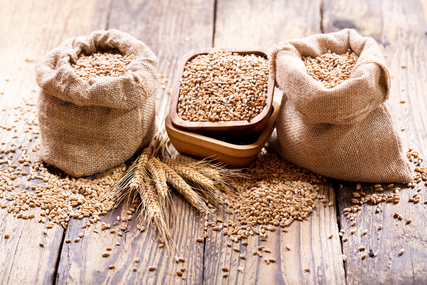Coeliac diseaseIf you have stumbled across my page then you probably have a vague idea already, and are most likely here looking for inspiration to further your healing. My aim is to write a series of descriptive and informative posts focusing on the various components that have contributed to my own recovery from damaged digestion, but I will kick things off with an overview of why some of us need to give gluten a wide berth.
What is gluten? First off the word gluten is derived from the Latin word meaning ‘glue’. That in itself should have been a neon warning sign complete with flashing lights that this stuff isn’t that digestible. It’s not like I’d choose to bind my cakes with copydex. In fact, as a child I was always making and creating works of art at home with my mum. When the pva ran dry, we would make our own glue from flour and water. Granted, this was somewhat lumpy and didn’t give my final artworks the finesse I craved at 5 years old, but it served its purpose. If some simple flour and water can stick some loo roll tubes to empty egg cartons, what is it doing to your gut? I find that there is a great misconception amongst the general public about what gluten actually is. Gluten itself is a term used for the proteins that are found in all varieties of wheat, rye and barley. In my experience, most people think that if you are a coeliac or gluten intolerant it simply means you can't eat bread. I've lost count of the amount of times people have acknowledged my condition and that I can't eat bread, the proceeded to offer me a cake or pastry. My grandfather for one is a tireless biscuit pusher. It happens everywhere I go and it doesn’t matter how many times I explain the condition, people seem to struggle with the concept and the severity of the reaction. I find that if I tell people I am a coeliac following an autoimmune adaptation of the paleo diet with low fodmaps thrown in, they cease the harassment out of sheer confusion and fear of poisoning me. Unfortunately due to the nature of the protein, and the magical transformative properties it possesses, it seemingly makes an appearance in many of the staples we take for granted in the western world. Gluten helps to create the elastic, maleable dough that gives us a warm crusty loaf of bread, a moist victoria sponge cake, the base of your takeaway pizza and Grandmas Yorkshire puddings in your Sunday roast. As if giving up these luxuries wasn’t enough, it nonsensically manages to worm its way into everything else too. Its in the sausages in your Saturday morning fry up, the sushi you buy for lunch when you are avoiding bread, the branded supermarket chips you’re craving because you’ve cut so many sources of carbs. Its even in the packet of pre cooked chicken you were going to put in your salad. Its verging on the ludicrous. I ask myself why its in so many foods all the time. I can only attribute this to the tastes (or lack of) that we have developed in our culture today. We want everything lighter, crispier, fluffier, bigger. But we are manipulating our food to the point that it doesn’t resemble food anymore. The nutritional value has been stripped away so we are left with something that looks fabulous in an instagram post but leaves us feeling like we have swallowed a brick. We are paying the ultimate price in the name of greed – our health. This is exactly the case with wheat. The wheat we are consuming today is not the same as the wheat consumed by our great grandparents. Way back when, wheat was a softer much more digestible variety. Over time this has been hybridised and replaced by a firmer, tougher variety. This 'new' wheat has great baking properties and as such we have adopted it throughout our diet for the appearance it gives to food. We haven't stopped to think about the fact that it is not all that digestible. As a result of farming methods and the various processes our 'food' now goes through before it reaches our plate, the prevalence of coeliac disease and various other digestive conditions are on the increase. Coeliac disease is not interchangeable with gluten intolerance or gluten sensitivity. It is an autoimmune response to the protein. All autoimmune diseases are born of a confused immune response from the body which leads it to attack its own tissue. In coeliac disease, when gluten is ingested, the immune system starts waging all out war against your own digestive system, damaging your gut in the process. The lining of your small intestine is lined with thousands of tiny 'vili' these are finger like protrusions (creepy) that are responsible for nutrient absorption. Under the sustained attack of the immune system , these guys get hit the hardest. They eventually get worn down and flattened in the process. Squished vili means poor nutrient absorption - and nobody wants that. As a result of this malabsorption, It is not at all uncommon for coeliacs to be iron and B12 deficient. The more deficient and malnourished the body becomes as a result, the more knock on effects there are to other areas of your health. Everything from bone thinning to infertility. It is estimated that 1 in 100 people in the UK have coeliac disease, however only 24% are actually diagnosed. Considering the long term affects of coeliac damage, it is alarming that so many continue to live their lives totally oblivious. And as mentioned previously the average diagnosis takes 13 years from the onset of symptoms - I am testimony to this! I can only attribute the lengthy diagnosis period to the fact that the disease can manifest itself in so many seemingly vague symptoms, and also that our medical system does not pay enough attention to the importance of our diet as a foundation for health. The list of symptoms is endless and will vary from person to person, with some experiencing constant digestive distress and others developing all manner of symptoms that affect anything but their digestion. Some of the common symptoms (but by no means exhaustive) : Bloating Gas Diarrhoea Constipation Tiredness Weight loss Brain fog Hair loss Anaemia Skin rashes Anxiety Depression Abdominal discomfort Numbness in hands and feet Oedema (fluid build up in hands, feet, arms and legs) Malnutrition How do we manage Coeliac disease? At the most basic and simple level you MUST remove every last trace of gluten from your diet, always and forever. Full stop. Cutting down or having the occasional treat just isn't even an option. It is not an exaggeration to say that even the tiniest speck of flour will throw your immune system into a furious frenzy. Managing coeliac disease is ultimately a multi-faceted and time consuming process. It is much much more than the removal of gluten. You need the time and the tools to repair and rebuild your digestion and reduce the chronic inflammation throughout. You need to correct nutritional imbalances and get your body to the stage that it is absorbing nutrients from your food again. You need to feed and nourish your body to give back all that it has been missing. All these steps take time and patience, but I assure you it is worth the effort! DISCLAIMER: The information on this blog is purely based on my own thoughts, views and opinions. I am telling these stories to share my experiences with you. The information does not constitute medical advice of any kind and is not intended to substitute the advice of a medical professional. You should consult with a registered GP for guidance on any health related issues and not make any medical decisions based on the information contained within this site. I have no medical training, I am quite simply a coeliac with a story to share.
0 Comments
Leave a Reply. |
Emma CarterThis blog tells an ongoing story about me and my journey back to health and happiness. A boho soul always looking for my next European adventure. I am a Coeliac, Yogi, paleo advocate, dreamer, Bon jovi connoisseur, sun worshipper, snuggly jumper wearer and wife to my lovely Paulie. Archives
April 2017
Categories
All
|



 RSS Feed
RSS Feed